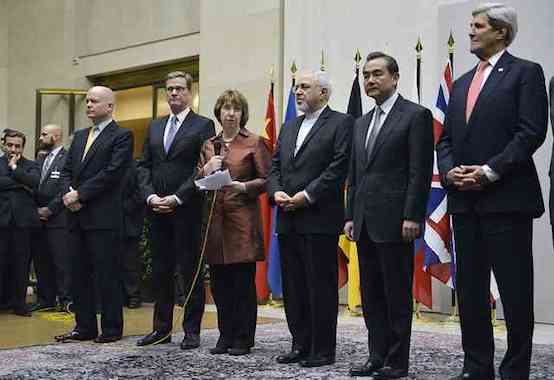The Deal With Iran

Uri Friedman describes the details of the interim nuclear deal with Iran:
The details are still coming into focus, but here are the basics: Iran will stop enriching uranium beyond the 5-percent level (nuclear power plants typically run on 3.5 percent-enriched uranium), refrain from installing new centrifuges for uranium enrichment, and dilute or convert to oxide its stockpile of 20 percent-enriched uranium (a level that allows Iran to quickly enrich uranium to the weapons-grade threshold of 90 percent). It will also refrain from producing fuel for or operating its heavy-water reactor near the city of Arak, which experts believe could produce weapons-grade plutonium. International monitors will be granted expanded access to Iran’s nuclear facilities.
In response, world powers will offer Iran billions of dollars in sanctions relief. Critically, the accord appears to be ambiguous on Iran’s right to enrich uranium—a key sticking point in the talks—with Iran and the United States interpreting the text in different ways.
The deal represents a good start to resolving the nuclear issue in the future, and as Friedman points out it also marks a significant improvement in U.S.-Iranian relations. It should not be news that top U.S. and Iranian officials have been meeting regularly and communicating directly with each other in recent weeks, but it is one of the more remarkable parts of this story because nothing like it has happened in decades. For Americans of my generation, all of this has been a huge break with what we have come to expect. The negotiation of a diplomatic agreement–any diplomatic agreement–with the Iranian government has been considered more or less unthinkable until just the last few years, and now it at least seems possible that one of the main causes of tension between America and Iran may be successfully managed so that armed conflict is avoided. It is hard to imagine such a deal being reached if the U.S. had been bombing Syria earlier this year, so we may partly owe this limited first success of diplomacy with Iran to the decision not to attack.
The deal may also prove to be a belated vindication of Obama’s engagement policy. He pursued engagement with Iran half-heartedly early in the first term and then more or less abandoned for the next few years. However, the administration has resumed engagement with Iran to a degree not seen in my lifetime, and it has done so in spite of significant opposition. There is no realistic chance that a different administration would have seized the opportunity that Rouhani’s election provided for negotiating a deal, because there would have been no interest in a deal and no willingness to recognize the opportunity. Provided that the U.S., the rest of the P5+1, and Iran are able to build on this to reach a more lasting and comprehensive agreement, and assuming that the would-be saboteurs keep failing to derail the process, this could be the beginning of a thaw in relations with Iran that could in turn help reduce tensions in the region.
Comments